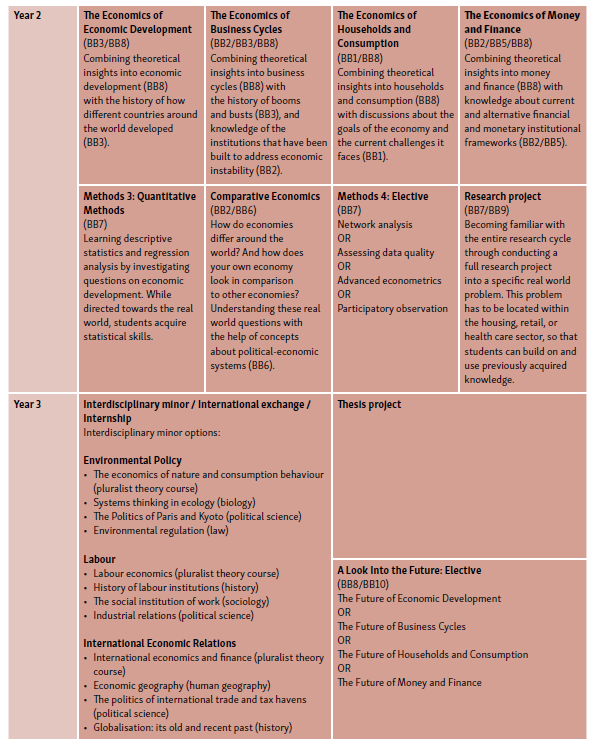Programme slogan: Economic thinking starts from the real world
Example Curricula
This chapter provides examples of how economics programmes could look and be structured. Such proposals help make the debate concrete and bring out potential trade-offs. This is important because critics of current programmes often simply ask to teach more and more, without considering practical limits on time and content. Curriculum proposals help us to flesh out not only what could be added to a programme, but also what could be left out. In addition, these examples show how the building blocks of Economy Studies can be combined to form coherent programmes.
This chapter is also intended to make clear once again: Economy Studies is not a blueprint of a single, ‘ideal’ curriculum. It is possible to design a wide variety of programmes with these building blocks, and it is our hope that they will be used for this. We firmly believe that the world is best served with a wide variety of economists. One size does not fit all.
Example Curricula:
- Bachelor in Economics with a Theoretical Focus
- Bachelor in Economics with a Real-World Focus
- Major Economics in a Liberal Arts and Sciences Programme
- Master in Public Economics
- Design Your Own Curriculum, Step by Step
- Master in Financial Economics
- Master in Economics of Climate Crises
- Research Master in Industrial Economics
Example Curriculum 2: Bachelor in Economics with a Real-World Focus
This programme puts real-world knowledge first. The majority of the theory courses start from economic history or sectoral analysis, only introducing the theoretical concepts later in the course. This is most visible in the first year, where the economic sectors of housing, retail and healthcare are all covered using this approach. The programme prepares students to work as an economist in government or in larger companies or non-profits. At the end of the degree, students will have gained a wide range of real-world knowledge of the economy, and be able to approach concrete economic questions in a practical and problem-solving oriented manner.
These sectoral courses include valuable knowledge on the real economy, but are also used to introduce a number of theoretical insights – which will be remembered all the better because they are taught on the basis of something concrete, rather than only as an abstract mathematical model. The first sectoral course (on housing) teaches students something about the role of law in the economy, the various levels of government that shape the sector, and the degree to which finance is interwoven with households in our daily economy. The second sectoral course (on retail) introduces theories about market mechanisms, market power, global value chains and digitisation. The third sectoral course (on healthcare) introduces a sector where public and private economic mechanisms are tightly interwoven, many products and services are primarily state-provided, professional associations hold a powerful position and ethical discussions on issues like the value of human life come front and centre in economic considerations.
The first year also has a double course on economic history. This course starts with the history of the economy, from which the history of economic thought then emerges. Students are provided with a basic overview of the various economic schools of thought, including their foundations and origins. This knowledge is not only taught for its own sake, but also to provide a firm basis for the thematic courses in Year 2.
These are taught on a more theoretical basis than the sectoral courses, but still start with, and continue to present, a large amount of real-world economic knowledge. Besides these thematic courses, the second year has three methods courses. As with the sectoral courses in Year 1, these are organised around actual topics of research, with students now creating their own data and working to answer real research questions.
This particular example curriculum has one additional goal: it presents a way to teach an Economy Studies-based programme at a faculty with a smaller staff. Besides having fewer economics electives, this shows in the structure of Year 3, which taps into the capacities of other social science faculties. Students choose from three different Interdisciplinary Minor programmes, each of which takes a deeper dive into an economic topic. As well as teaching students about that specific topic, it also provides them with an introduction to the frameworks of several other disciplines (mostly social sciences). This takes students out of the box of economic approaches and will help them in later life to more easily communicate with professionals trained in other disciplines. The final courses look ahead by exploring how the topics that were covered in the second-year thematic courses might look in the future.
In summary, this programme builds from the real world towards theory and methods, rather than the other way around. It also introduces students to other disciplines’ approaches to economic questions, lightening the teaching load of the economics department, whilst at the same time broadening students’ perspectives.
Programme overview

